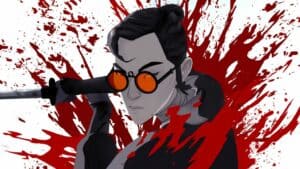Blue Eye Samurai follows a mixed-race master of the sword in Edo-period Japan, living life in disguise while seeking vengeance. The series is currently streaming on Netflix.
Story
Lone-wolf, mixed-race warrior Mizu is on a quest for revenge against the white man who was responsible for her life of prejudice and abandonment.
On her quest, she meets an over-eager soba maker who aspires to be a samurai in spite of having no hands. Against her will and much to her chagrin, Ringo makes himself her apprentice.
Akemi, daughter of Lord Daichi Tokunobe, wishes to control her fate and also to marry her love Taigen, an honorable samurai. However, when he’s humiliated and defeated by Mizu, Tokunobe changes his mind about letting Akemi marry him.
Taigen sets off to track Mizu down and fix an official rematch to regain his honor. Akemi follows and runs away from home, not only to find Taigen but to run away from the rumored cruel son of the Shogun, with whom she’s been arranged to marry.
Taigen and Mizu form a complicated friendship as the two end up being instrumental in thwarting the coup on the Imperial castle before all is ruined, by the Wester trader Abijah Fowler, the man who can be Mizu’s potential father.
Akemi takes control of her life and decides to stay married to Takayoshi, seeking greatness and in doing so, parting ways with Taigen.
Mizu defeats Fowler and takes him captive as he leads her to other of his partners, among whom he claims would be her father, as Blue Eye Samurai season 1 ends.
Performances
Maya Erskine lends her voice, talents, and acting prowess to the Blue Eye Samurai, Mizu. She is incredible at making the character feel so real and so easy for the audience to root for her.
One might even find it difficult to tell right away if the character is supposed to be a woman or a man. Erskine modulates really well and helps keep the mask on Mizu’s gender until it’s lifted by the visuals.
She’s also a revelation when it comes to the fury, grief, and hurt she’s able to convey with but only her voice.
Masi Oka is a delight and a gust of warm breeze whenever Ringo speaks up, and he speaks a lot. This could be bad and lend to some annoyance but Ola’s voice is so innocent it’s never hard on the ears.
Darren Barret voices Taigen and does a good job conveying envy, insecurity, and conflict that churns Taigen’s insides. Brenda Song is as amazing as Akemi, and her voice inflections match the facial animations swimmingly well.
Kenneth Branagh is a force to be reckoned with and compelling as the fortified giant white man with perverse and violent tendencies.
Positives
The visual palette of Blue Eye Samurai is extremely gorgeous and appealing. It’s also quite authentic to the Edo-era Japan.
The animation incorporates both 2D and 3D to create visuals that don’t feel janky or weird, something that can often occur with 3D.
The talent in the voice cast is massive and it comes across in the final product as the viewers look on to and listen to characters that in spite of the fantasy-like setting, feel so real.
It is easy to root for Mizu and even if the story doesn’t exactly do anything groundbreaking, it provides enough fodder for the main characters and their motivations to be fleshed out properly.
The women in Blue Eye Samurai are refreshingly well-written and aren’t just there to be scream queens or just one-note beasts of brute strength. There are layers to each character and most of them go through developments that feel organic.
The choreography in the fight scenes offers many thrills and when the show just wants to be a bloody affair, it is that and then some. The sex scenes are also rather thoughtfully employed in the story.
It is also commendable how the show doesn’t shy away from the bleak nature of the setting the characters all lead their lives in. Tragedy is frequently around the corner and all such corners are well-lit in the show.
Negatives
The catharsis for the central conflict is not as satisfyingly delivered, as Fowler lives to see another day and now most likely conspires to regain his freedom and deal another blow to Japan. That, and a sequel was always in order so a satisfying closure was impossible.
Ringo doesn’t really get any big character development apart from a moment that although great, only reiterates a core part of his character that’s already been established.
Most of the mysteries related to Mizu are kept shrouded to the end, which is a really annoying trend in contemporary media that believes more in the prospect of future installments than to tell a complete story in only one.
Verdict
Blue Eye Samurai is a visually stunning animated series with no holds barred when it comes to violence and engaging battles.
A straightforward revenge tale at its center, the overall story is anything but simple, with a lot on the periphery that makes the world and the different characters so interesting to follow.
Creators/Executive Producers/Writers: Amber Noizumi & Michael Green
Supervising Producer/Director: Jane Wu
Blue Eye Samurai

Date Created: 2023-11-03 12:30
4
Also Read: Onimusha (2023) review: Poor story drags down the overall experience

